Module 3 Life now and then Unit 3 Language in use (共31张PPT)
文档属性
| 名称 | Module 3 Life now and then Unit 3 Language in use (共31张PPT) | 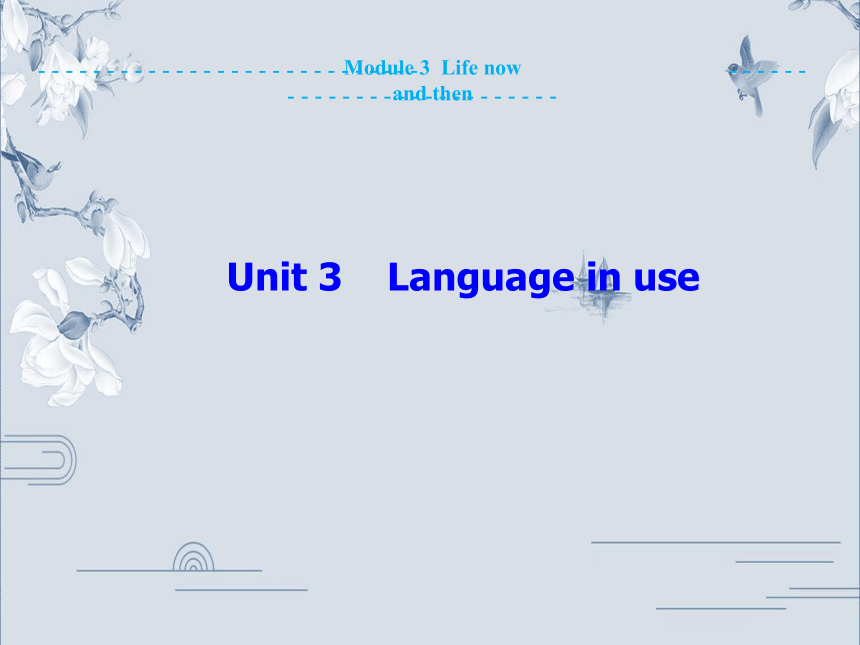 | |
| 格式 | zip | ||
| 文件大小 | 974.8KB | ||
| 资源类型 | 教案 | ||
| 版本资源 | 外研版 | ||
| 科目 | 英语 | ||
| 更新时间 | 2020-02-08 15:04:34 | ||
图片预览

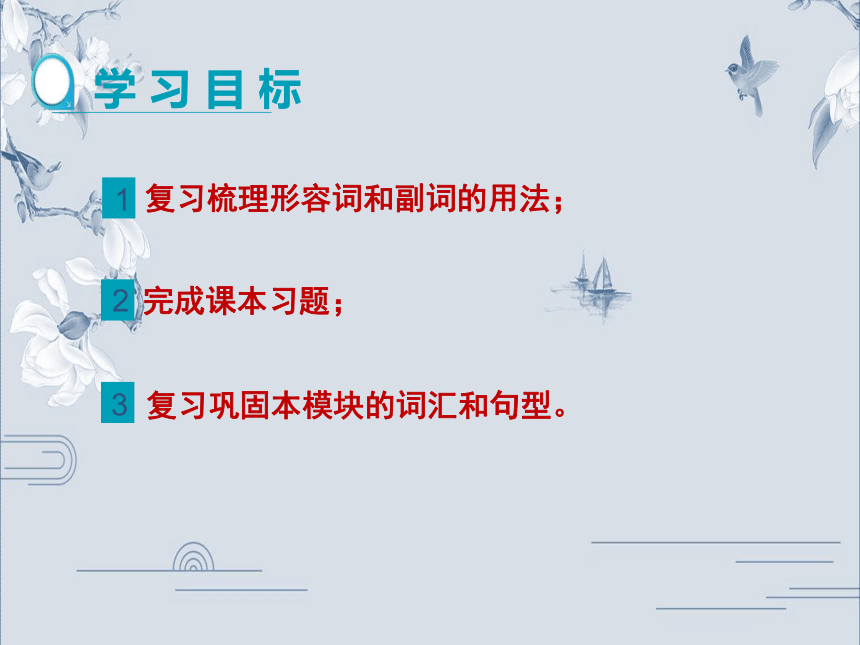
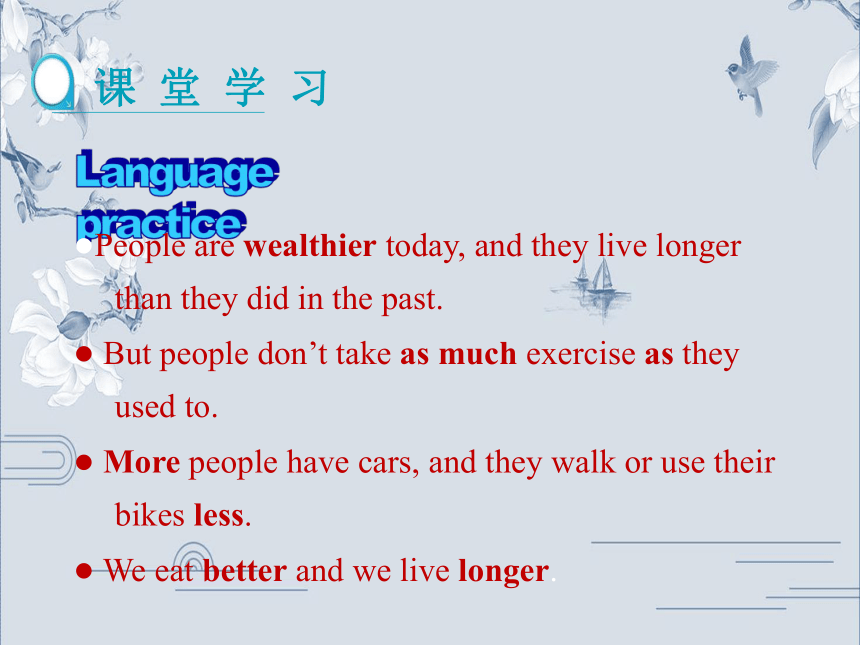
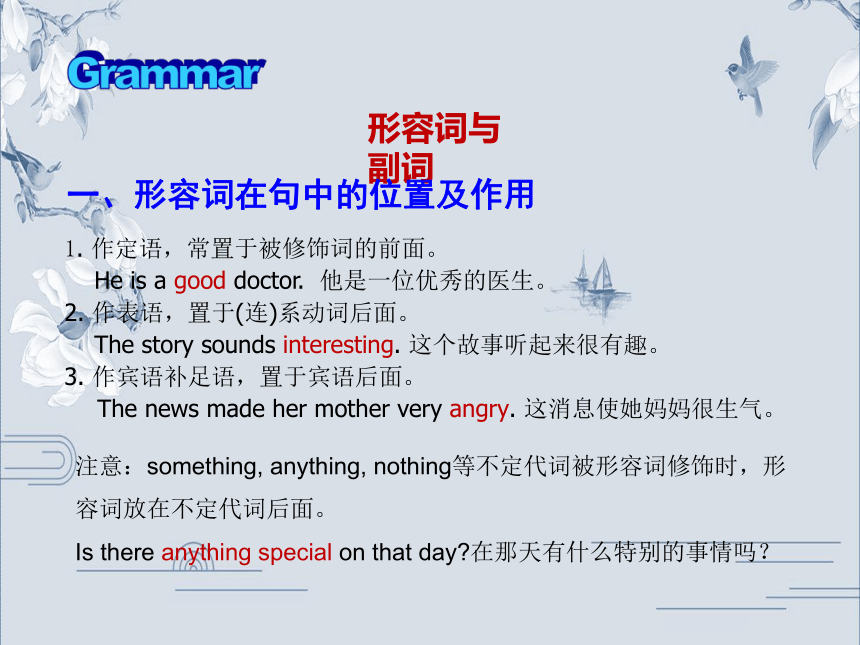
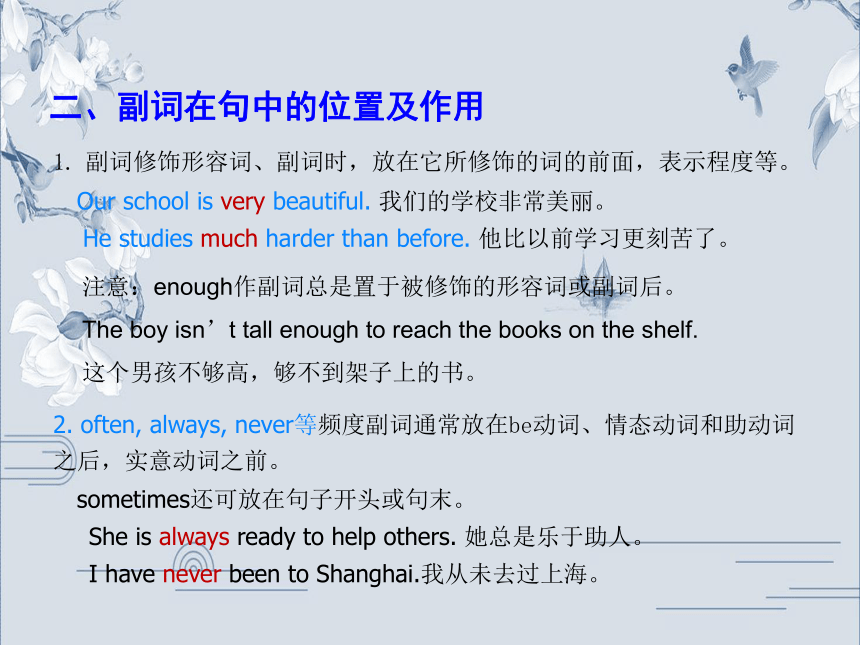
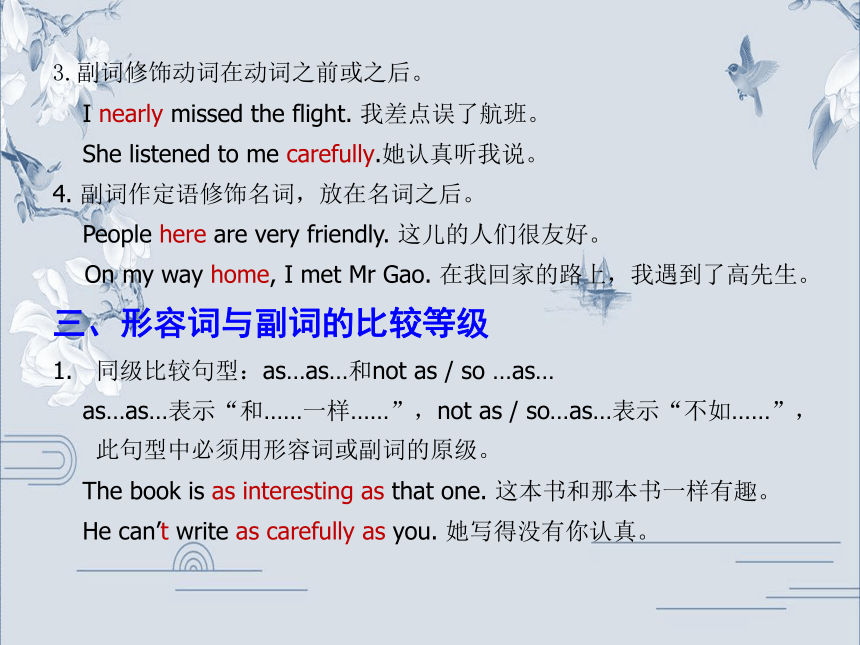
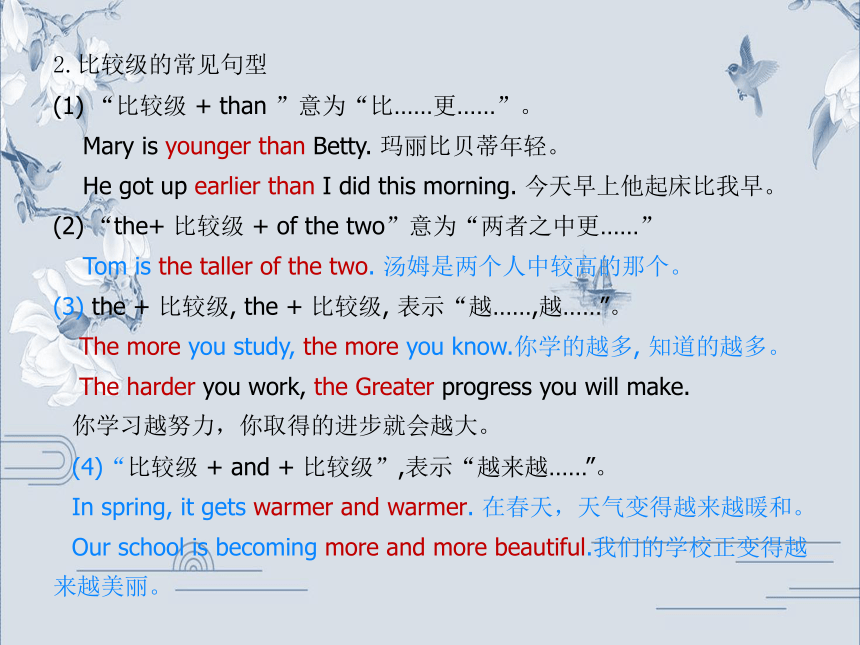
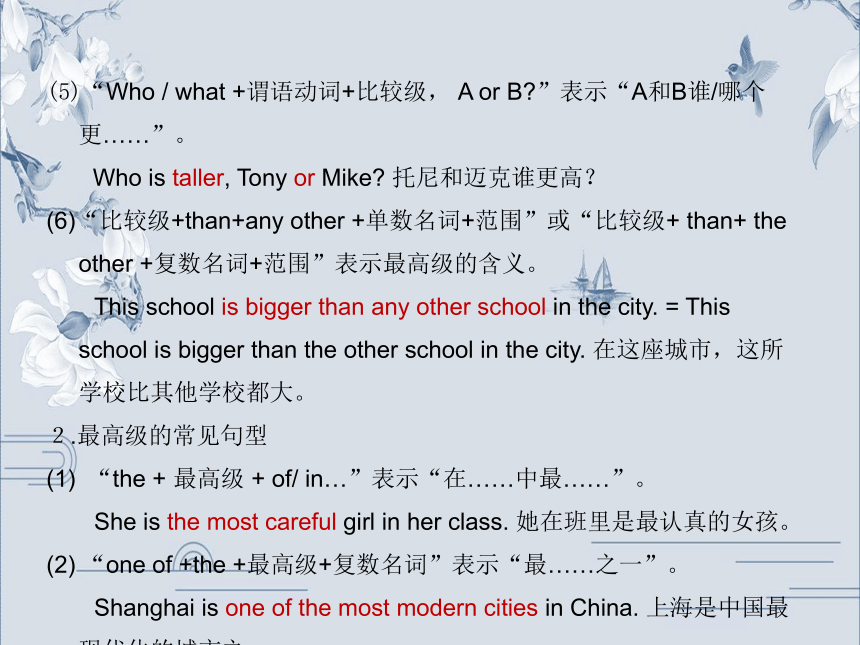
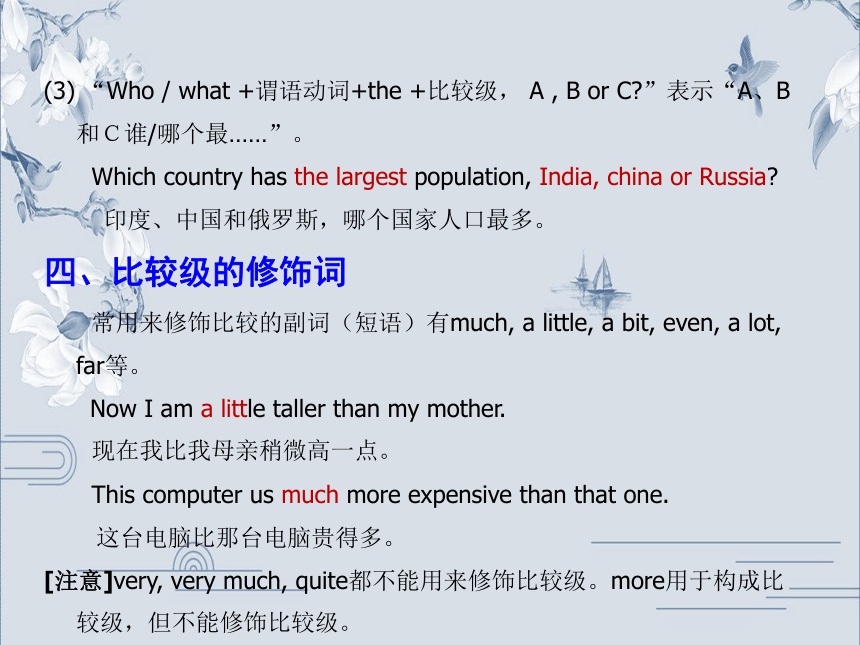
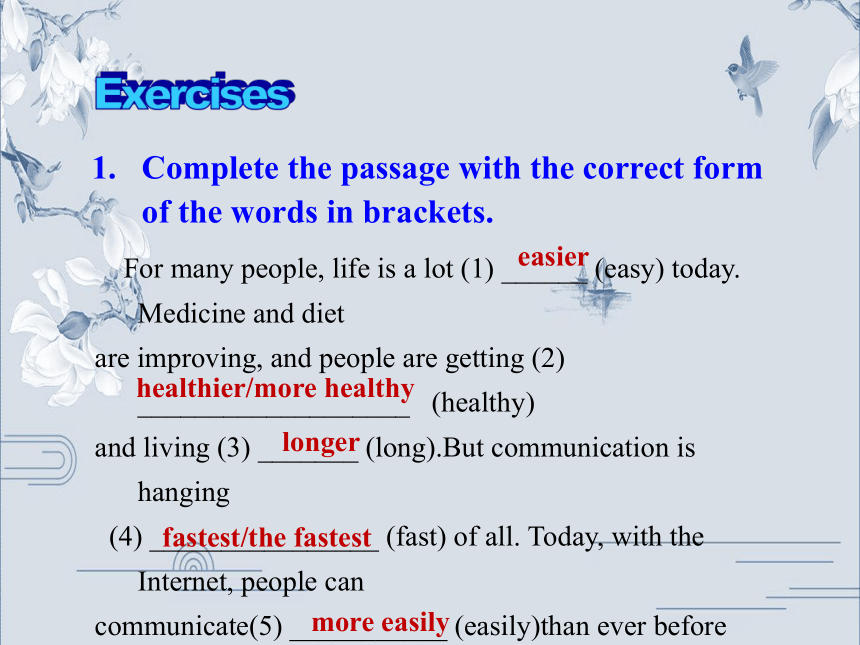
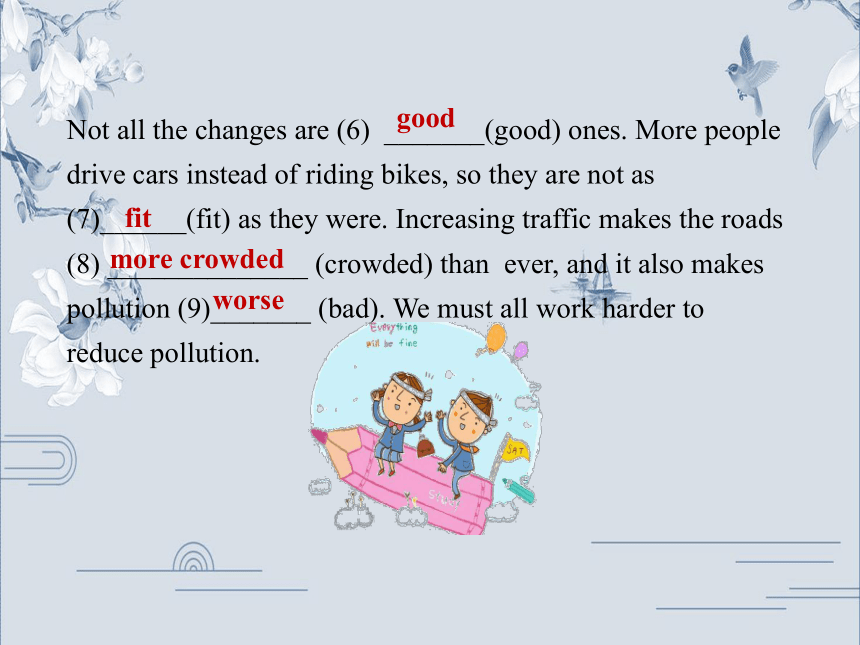
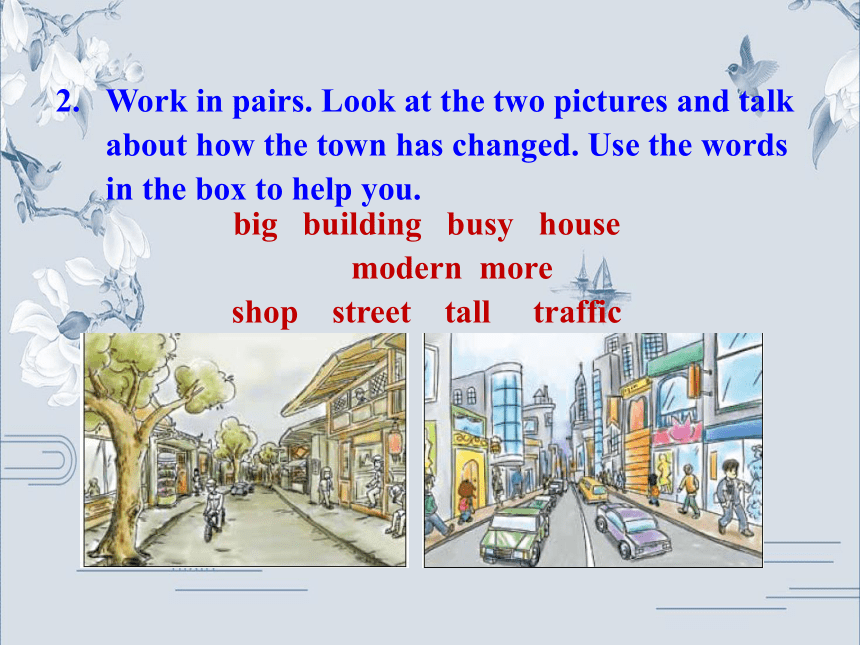
文档简介
(共32张PPT)
Unit 3 Language in use
Module 3 Life now and then
---------------------------- --------------------------
学 习 目 标
复习梳理形容词和副词的用法;
1
3
复习巩固本模块的词汇和句型。
完成课本习题;
2
课 堂 学 习
Language practice
●People are wealthier today, and they live longer than they did in the past.
● But people don’t take as much exercise as they used to.
● More people have cars, and they walk or use their bikes less.
● We eat better and we live longer.
Grammar
形容词与副词
一、形容词在句中的位置及作用
1. 作定语,常置于被修饰词的前面。
He is a good doctor. 他是一位优秀的医生。
2. 作表语,置于(连)系动词后面。
The story sounds interesting. 这个故事听起来很有趣。
3. 作宾语补足语,置于宾语后面。
The news made her mother very angry. 这消息使她妈妈很生气。
注意:something, anything, nothing等不定代词被形容词修饰时,形容词放在不定代词后面。
Is there anything special on that day?在那天有什么特别的事情吗?
二、副词在句中的位置及作用
副词修饰形容词、副词时,放在它所修饰的词的前面,表示程度等。
Our school is very beautiful. 我们的学校非常美丽。
He studies much harder than before. 他比以前学习更刻苦了。
2. often, always, never等频度副词通常放在be动词、情态动词和助动词之后,实意动词之前。
sometimes还可放在句子开头或句末。
She is always ready to help others. 她总是乐于助人。
I have never been to Shanghai.我从未去过上海。
注意:enough作副词总是置于被修饰的形容词或副词后。
The boy isn’t tall enough to reach the books on the shelf.
这个男孩不够高,够不到架子上的书。
3.副词修饰动词在动词之前或之后。
I nearly missed the flight. 我差点误了航班。
She listened to me carefully.她认真听我说。
4. 副词作定语修饰名词,放在名词之后。
People here are very friendly. 这儿的人们很友好。
On my way home, I met Mr Gao. 在我回家的路上,我遇到了高先生。
三、形容词与副词的比较等级
同级比较句型:as…as…和not as / so …as…
as…as…表示“和……一样……”,not as / so…as…表示“不如……”,此句型中必须用形容词或副词的原级。
The book is as interesting as that one. 这本书和那本书一样有趣。
He can’t write as carefully as you. 她写得没有你认真。
2.比较级的常见句型
(1) “比较级 + than ”意为“比……更……”。
Mary is younger than Betty. 玛丽比贝蒂年轻。
He got up earlier than I did this morning. 今天早上他起床比我早。
(2) “the+ 比较级 + of the two”意为“两者之中更……”
Tom is the taller of the two. 汤姆是两个人中较高的那个。
(3) the + 比较级, the + 比较级, 表示“越……,越……”。
The more you study, the more you know.你学的越多, 知道的越多。
The harder you work, the Greater progress you will make.
你学习越努力,你取得的进步就会越大。
(4)“比较级 + and + 比较级”,表示“越来越……”。
In spring, it gets warmer and warmer. 在春天,天气变得越来越暖和。
Our school is becoming more and more beautiful.我们的学校正变得越来越美丽。
(5)“Who / what +谓语动词+比较级, A or B?”表示“A和B谁/哪个更……”。
Who is taller, Tony or Mike? 托尼和迈克谁更高?
(6)“比较级+than+any other +单数名词+范围”或“比较级+ than+ the other +复数名词+范围”表示最高级的含义。
This school is bigger than any other school in the city. = This school is bigger than the other school in the city. 在这座城市,这所学校比其他学校都大。
2.最高级的常见句型
(1) “the + 最高级 + of/ in…”表示“在……中最……”。
She is the most careful girl in her class. 她在班里是最认真的女孩。
(2) “one of +the +最高级+复数名词”表示“最……之一”。
Shanghai is one of the most modern cities in China. 上海是中国最现代化的城市之一。
(3) “Who / what +谓语动词+the +比较级, A , B or C?”表示“A、B和C谁/哪个最……”。
Which country has the largest population, India, china or Russia?
印度、中国和俄罗斯,哪个国家人口最多。
四、比较级的修饰词
常用来修饰比较的副词(短语)有much, a little, a bit, even, a lot, far等。
Now I am a little taller than my mother.
现在我比我母亲稍微高一点。
This computer us much more expensive than that one.
这台电脑比那台电脑贵得多。
[注意]very, very much, quite都不能用来修饰比较级。more用于构成比较级,但不能修饰比较级。
Complete the passage with the correct form of the words in brackets.
For many people, life is a lot (1) ______ (easy) today. Medicine and diet
are improving, and people are getting (2) ___________________ (healthy)
and living (3) _______ (long).But communication is hanging
(4) ________________ (fast) of all. Today, with the Internet, people can
communicate(5) ___________ (easily)than ever before with friends all over
the world.
healthier/more healthy
longer
easier
fastest/the fastest
Exercises
more easily
Not all the changes are (6) _______(good) ones. More people drive cars instead of riding bikes, so they are not as (7)______(fit) as they were. Increasing traffic makes the roads (8) ______________ (crowded) than ever, and it also makes pollution (9)_______ (bad). We must all work harder to reduce pollution.
good
fit
more crowded
worse
Work in pairs. Look at the two pictures and talk about how the town has changed. Use the words in the box to help you.
big building busy house modern more
shop street tall traffic tree
The buildings are much taller, much more beautiful.
2. There are more cars in the street today than it was 50 years ago.
3. The streets are much wider and cleaner.
4. The environment is much better.
5. People are much busier than before.
6. The life is much better than before.
7. There are more shops than before.
The sample answers
3. Complete the sentences with the words or expressions in the box.
We __________ have time to go on holiday.
We do not have much ________ time because we have important exams this year.
3. Never go out in the ________of the day without a hat.
4. You have to ___________ because the students in the back cannot hear you.
5. Mr Smith is ___________ a teacher. Most of his pupils think of him as their friend.
seldom
heat more than seldom spare speak up
spare
heat
speak up
more than
4. Read the email and find three examples that show life was harder
in the past than it is today.
FROM: Gran
TO: Christine
SUBJECT: The lives of children in Victorian Britain
Dear Christine,
You asked me for help about your school project—the lives of children in Victorian
Britain. I was also interested. I searched online and found out the following.
ask for意为“请求”。ask sb. for help表示“请某人帮忙”
find out表示“通过调查研究查询等查明;发现“
In Victorian Britain, thousands of people came to the cities to work in the factories.
Instead of the green, open countryside, people lived in very small houses, very
close to each other, with no space for children to play. Families in those days were
quite big. Often, there were four or five children in one family, and they all had to
sleep in houses of just two rooms. Sometimes, a whole street had to share one
outside toilet. Can you imagine that?
Most of the big cities were dirty and unhealthy. The pollution from factories filled
the air. People put their rubbish outside in the streets. As a result, there were many
illnesses.
instead of介词短语,意为“而不是”
as a result意为“结果”
And life was harder for children in those times. They didn’t always go to school,
because they had to work instead. Many children started work in factories when
they were only four or five years old. They worked twelve hours a day in dangerous
jobs for very little money. Many were hurt in accidents with machines. I hope this
is helpful. Write to me if you need more information.
With love,
Gran
Read the email again. Find sentences that tell us:
1. There was not enough living space for people.
2. Most of the big cities were dirty and unhealthy.
3. Life was harder for children in those times.
Write examples.
1. People lived in very small houses, very close to each other, with no space for children to play.
______________________________________________________
______________________________________________________.
_______________________________________________________
_______________________________________________________
_______________________________________________________.
The pollution from factories filled the air People put their rubbish outside in
the streets. As a result, there were many illnesses.
They didn’t always go to school, because they had to work instead. Many
children started work in factories when they were only four or five years old.
They worked twelve hours a day in dangerous jobs for very little money.
When you do a listening or reading exercise, you should read the instructions carefully. Then you can focus your attention just on the information you need. You don’t have to understand every word.
Learning to learn
6. Listen and complete the table.
Grandmother Mother
Age to start school
Age to start work
Age to get married
Number of children
Age to stop working
8 years old
6 years old
four children
one child
50 years old
55 years old
18 years old
24 years old
14 years old
22 years old
7. Write a passage comparing the lives of the speaker’s grandmother
and mother in Activity 6.
The speaker’s grandmother and mother have lived very different lives.
Her grandmother had a much bigger family…
The speaker’s grandmother and mother have lived very different lives. Her grandmother had a much bigger family of four children. The speaker’s mother has only one child. Her grandmother and mother had different childhoods. Her grandmother started school later. She didn’t start school until she was eight. Her mother started school earlier, when she was six. Her grandmother didn’t have many years of education. She started work when she was fourteen. Her mother was luckier, because she went to university after she finished school, and started work when she was twenty-two. Her grandmother got married earlier than her mother. Her grandmother got married at the age of 18 and her mother got married at the age of 24. They stopped working at different ages. Her grandmother stopped working at t age 50 and her mother did at age 55.
A Sample
Around the world
Cars
The modern car has changed life a great deal. Before the invention of the car, people had to travel by rail, on horseback or by horse-drawn carriage, or on foot. Using horses for travel was slow, and of course walking was even slower. Cars allow people to travel long distances quickly, in comfort and convenience.
The car also solved an enormous problem caused by using horses for transport in cities: manure! There were so many horses in large cities that it was almost impossible to get rid of the manure. Modern people are used to the idea that cars cause pollution, but the first cars actually made cities cleaner!
allow sb. to do sth.意为“允许某人做某事”,动词不定式(短语)作宾补
so…that…句型,意为“如此……以至……”
be used to意为“习惯于……”
8. Work in groups. Read the motion of the debate.
Health is more important than wealth.
Now decide who is for the motion and who is against it. You can
use some of the following ideas:
Module task: Organising a debate
For:
● Without health, wealth means
nothing.
● You can enjoy life better if you are healthy.
Against:
● It is hard to be healthy without
wealth.
● You can enjoy life better if you are wealthy.
9. Prepare your arguments. Give examples to support your ideas.
10. Hold the debate.
● Those for the motion give their opinions.
● Those against the motion give their opinions.
● Take turns to say what you think about each other’s arguments.
11. Discuss and find out whether most people are for or against the motion.
10. Work in groups. Find a news story about a good deed and turn it into a short play. Decide:
● the characters
● the place and time
● the plot
Now write the play.
Module task: Writing and acting out a short play
11. Decide who will play each character.
12. Act out the play to the whole class.
课 堂 达 标
Although he listened to the old man ______, he could ______ understand his words.
A. patiently; hardly B. patient; hard
C. patiently; hard D. patient; hardly
2. Peter is ______ boy in our class and he often helps us carry heavy things.
A. strong B. stronger C. strongest D. the strongest
3. I didn’t do very well in this exam. Unluckily, he did it ______.
A. worse B. badly C. better D. worst
A
D
A
4. --- Jack, how was your summer vacation?
--- Just so-so, I decided to go ______ for my next vacation.
A. something wonderful B. wonderful something
C. somewhere wonderful D. wonderful somewhere
5. You are speaking too fast. Can you speak a little ______?
A. more slowly B. most slowly
C. more loudly D. most loudly
6. My time in the middle school was one of ______ periods of my life.
A. exciting B more exciting C. the more exciting D. the most exciting
C
A
D
Homework
1. Go over what you’ve learnt in Unit 3.
2. Preview the new words and expressions in Module 4.
Thank you !
Unit 3 Language in use
Module 3 Life now and then
---------------------------- --------------------------
学 习 目 标
复习梳理形容词和副词的用法;
1
3
复习巩固本模块的词汇和句型。
完成课本习题;
2
课 堂 学 习
Language practice
●People are wealthier today, and they live longer than they did in the past.
● But people don’t take as much exercise as they used to.
● More people have cars, and they walk or use their bikes less.
● We eat better and we live longer.
Grammar
形容词与副词
一、形容词在句中的位置及作用
1. 作定语,常置于被修饰词的前面。
He is a good doctor. 他是一位优秀的医生。
2. 作表语,置于(连)系动词后面。
The story sounds interesting. 这个故事听起来很有趣。
3. 作宾语补足语,置于宾语后面。
The news made her mother very angry. 这消息使她妈妈很生气。
注意:something, anything, nothing等不定代词被形容词修饰时,形容词放在不定代词后面。
Is there anything special on that day?在那天有什么特别的事情吗?
二、副词在句中的位置及作用
副词修饰形容词、副词时,放在它所修饰的词的前面,表示程度等。
Our school is very beautiful. 我们的学校非常美丽。
He studies much harder than before. 他比以前学习更刻苦了。
2. often, always, never等频度副词通常放在be动词、情态动词和助动词之后,实意动词之前。
sometimes还可放在句子开头或句末。
She is always ready to help others. 她总是乐于助人。
I have never been to Shanghai.我从未去过上海。
注意:enough作副词总是置于被修饰的形容词或副词后。
The boy isn’t tall enough to reach the books on the shelf.
这个男孩不够高,够不到架子上的书。
3.副词修饰动词在动词之前或之后。
I nearly missed the flight. 我差点误了航班。
She listened to me carefully.她认真听我说。
4. 副词作定语修饰名词,放在名词之后。
People here are very friendly. 这儿的人们很友好。
On my way home, I met Mr Gao. 在我回家的路上,我遇到了高先生。
三、形容词与副词的比较等级
同级比较句型:as…as…和not as / so …as…
as…as…表示“和……一样……”,not as / so…as…表示“不如……”,此句型中必须用形容词或副词的原级。
The book is as interesting as that one. 这本书和那本书一样有趣。
He can’t write as carefully as you. 她写得没有你认真。
2.比较级的常见句型
(1) “比较级 + than ”意为“比……更……”。
Mary is younger than Betty. 玛丽比贝蒂年轻。
He got up earlier than I did this morning. 今天早上他起床比我早。
(2) “the+ 比较级 + of the two”意为“两者之中更……”
Tom is the taller of the two. 汤姆是两个人中较高的那个。
(3) the + 比较级, the + 比较级, 表示“越……,越……”。
The more you study, the more you know.你学的越多, 知道的越多。
The harder you work, the Greater progress you will make.
你学习越努力,你取得的进步就会越大。
(4)“比较级 + and + 比较级”,表示“越来越……”。
In spring, it gets warmer and warmer. 在春天,天气变得越来越暖和。
Our school is becoming more and more beautiful.我们的学校正变得越来越美丽。
(5)“Who / what +谓语动词+比较级, A or B?”表示“A和B谁/哪个更……”。
Who is taller, Tony or Mike? 托尼和迈克谁更高?
(6)“比较级+than+any other +单数名词+范围”或“比较级+ than+ the other +复数名词+范围”表示最高级的含义。
This school is bigger than any other school in the city. = This school is bigger than the other school in the city. 在这座城市,这所学校比其他学校都大。
2.最高级的常见句型
(1) “the + 最高级 + of/ in…”表示“在……中最……”。
She is the most careful girl in her class. 她在班里是最认真的女孩。
(2) “one of +the +最高级+复数名词”表示“最……之一”。
Shanghai is one of the most modern cities in China. 上海是中国最现代化的城市之一。
(3) “Who / what +谓语动词+the +比较级, A , B or C?”表示“A、B和C谁/哪个最……”。
Which country has the largest population, India, china or Russia?
印度、中国和俄罗斯,哪个国家人口最多。
四、比较级的修饰词
常用来修饰比较的副词(短语)有much, a little, a bit, even, a lot, far等。
Now I am a little taller than my mother.
现在我比我母亲稍微高一点。
This computer us much more expensive than that one.
这台电脑比那台电脑贵得多。
[注意]very, very much, quite都不能用来修饰比较级。more用于构成比较级,但不能修饰比较级。
Complete the passage with the correct form of the words in brackets.
For many people, life is a lot (1) ______ (easy) today. Medicine and diet
are improving, and people are getting (2) ___________________ (healthy)
and living (3) _______ (long).But communication is hanging
(4) ________________ (fast) of all. Today, with the Internet, people can
communicate(5) ___________ (easily)than ever before with friends all over
the world.
healthier/more healthy
longer
easier
fastest/the fastest
Exercises
more easily
Not all the changes are (6) _______(good) ones. More people drive cars instead of riding bikes, so they are not as (7)______(fit) as they were. Increasing traffic makes the roads (8) ______________ (crowded) than ever, and it also makes pollution (9)_______ (bad). We must all work harder to reduce pollution.
good
fit
more crowded
worse
Work in pairs. Look at the two pictures and talk about how the town has changed. Use the words in the box to help you.
big building busy house modern more
shop street tall traffic tree
The buildings are much taller, much more beautiful.
2. There are more cars in the street today than it was 50 years ago.
3. The streets are much wider and cleaner.
4. The environment is much better.
5. People are much busier than before.
6. The life is much better than before.
7. There are more shops than before.
The sample answers
3. Complete the sentences with the words or expressions in the box.
We __________ have time to go on holiday.
We do not have much ________ time because we have important exams this year.
3. Never go out in the ________of the day without a hat.
4. You have to ___________ because the students in the back cannot hear you.
5. Mr Smith is ___________ a teacher. Most of his pupils think of him as their friend.
seldom
heat more than seldom spare speak up
spare
heat
speak up
more than
4. Read the email and find three examples that show life was harder
in the past than it is today.
FROM: Gran
TO: Christine
SUBJECT: The lives of children in Victorian Britain
Dear Christine,
You asked me for help about your school project—the lives of children in Victorian
Britain. I was also interested. I searched online and found out the following.
ask for意为“请求”。ask sb. for help表示“请某人帮忙”
find out表示“通过调查研究查询等查明;发现“
In Victorian Britain, thousands of people came to the cities to work in the factories.
Instead of the green, open countryside, people lived in very small houses, very
close to each other, with no space for children to play. Families in those days were
quite big. Often, there were four or five children in one family, and they all had to
sleep in houses of just two rooms. Sometimes, a whole street had to share one
outside toilet. Can you imagine that?
Most of the big cities were dirty and unhealthy. The pollution from factories filled
the air. People put their rubbish outside in the streets. As a result, there were many
illnesses.
instead of介词短语,意为“而不是”
as a result意为“结果”
And life was harder for children in those times. They didn’t always go to school,
because they had to work instead. Many children started work in factories when
they were only four or five years old. They worked twelve hours a day in dangerous
jobs for very little money. Many were hurt in accidents with machines. I hope this
is helpful. Write to me if you need more information.
With love,
Gran
Read the email again. Find sentences that tell us:
1. There was not enough living space for people.
2. Most of the big cities were dirty and unhealthy.
3. Life was harder for children in those times.
Write examples.
1. People lived in very small houses, very close to each other, with no space for children to play.
______________________________________________________
______________________________________________________.
_______________________________________________________
_______________________________________________________
_______________________________________________________.
The pollution from factories filled the air People put their rubbish outside in
the streets. As a result, there were many illnesses.
They didn’t always go to school, because they had to work instead. Many
children started work in factories when they were only four or five years old.
They worked twelve hours a day in dangerous jobs for very little money.
When you do a listening or reading exercise, you should read the instructions carefully. Then you can focus your attention just on the information you need. You don’t have to understand every word.
Learning to learn
6. Listen and complete the table.
Grandmother Mother
Age to start school
Age to start work
Age to get married
Number of children
Age to stop working
8 years old
6 years old
four children
one child
50 years old
55 years old
18 years old
24 years old
14 years old
22 years old
7. Write a passage comparing the lives of the speaker’s grandmother
and mother in Activity 6.
The speaker’s grandmother and mother have lived very different lives.
Her grandmother had a much bigger family…
The speaker’s grandmother and mother have lived very different lives. Her grandmother had a much bigger family of four children. The speaker’s mother has only one child. Her grandmother and mother had different childhoods. Her grandmother started school later. She didn’t start school until she was eight. Her mother started school earlier, when she was six. Her grandmother didn’t have many years of education. She started work when she was fourteen. Her mother was luckier, because she went to university after she finished school, and started work when she was twenty-two. Her grandmother got married earlier than her mother. Her grandmother got married at the age of 18 and her mother got married at the age of 24. They stopped working at different ages. Her grandmother stopped working at t age 50 and her mother did at age 55.
A Sample
Around the world
Cars
The modern car has changed life a great deal. Before the invention of the car, people had to travel by rail, on horseback or by horse-drawn carriage, or on foot. Using horses for travel was slow, and of course walking was even slower. Cars allow people to travel long distances quickly, in comfort and convenience.
The car also solved an enormous problem caused by using horses for transport in cities: manure! There were so many horses in large cities that it was almost impossible to get rid of the manure. Modern people are used to the idea that cars cause pollution, but the first cars actually made cities cleaner!
allow sb. to do sth.意为“允许某人做某事”,动词不定式(短语)作宾补
so…that…句型,意为“如此……以至……”
be used to意为“习惯于……”
8. Work in groups. Read the motion of the debate.
Health is more important than wealth.
Now decide who is for the motion and who is against it. You can
use some of the following ideas:
Module task: Organising a debate
For:
● Without health, wealth means
nothing.
● You can enjoy life better if you are healthy.
Against:
● It is hard to be healthy without
wealth.
● You can enjoy life better if you are wealthy.
9. Prepare your arguments. Give examples to support your ideas.
10. Hold the debate.
● Those for the motion give their opinions.
● Those against the motion give their opinions.
● Take turns to say what you think about each other’s arguments.
11. Discuss and find out whether most people are for or against the motion.
10. Work in groups. Find a news story about a good deed and turn it into a short play. Decide:
● the characters
● the place and time
● the plot
Now write the play.
Module task: Writing and acting out a short play
11. Decide who will play each character.
12. Act out the play to the whole class.
课 堂 达 标
Although he listened to the old man ______, he could ______ understand his words.
A. patiently; hardly B. patient; hard
C. patiently; hard D. patient; hardly
2. Peter is ______ boy in our class and he often helps us carry heavy things.
A. strong B. stronger C. strongest D. the strongest
3. I didn’t do very well in this exam. Unluckily, he did it ______.
A. worse B. badly C. better D. worst
A
D
A
4. --- Jack, how was your summer vacation?
--- Just so-so, I decided to go ______ for my next vacation.
A. something wonderful B. wonderful something
C. somewhere wonderful D. wonderful somewhere
5. You are speaking too fast. Can you speak a little ______?
A. more slowly B. most slowly
C. more loudly D. most loudly
6. My time in the middle school was one of ______ periods of my life.
A. exciting B more exciting C. the more exciting D. the most exciting
C
A
D
Homework
1. Go over what you’ve learnt in Unit 3.
2. Preview the new words and expressions in Module 4.
Thank you !
同课章节目录
- Module 1 Travel
- Unit 1 We toured the city by bus and by taxi
- Unit 2 It's a long story.
- Unit 3 Language in use
- Module 2 Education
- Unit 1 They don't sit in rows.
- Unit 2 What do I like best about school?
- Unit 3 Language in use
- Module 3 Life now and then
- Unit 1 They sometimes work harder.
- Unit 2 I think life is better today.
- Unit 3 Language in use.
- Module 4 Rules and suggestions
- Unit 1 You must be careful of falling stones.
- Unit 2 we must keep the camp clean.
- Unit 3 Language in use.
- Revison A
- Module 5 Look after yourself
- Unit 1 We'd better get you to hospital.
- Unit 2 Get off the sofa!
- Unit 3 Language in use.
- Module 6 Eating togethe
- Unit 1 When is the school-leavers' party?
- Unit 2 Knives and forks are used for most Western
- Unit 3 Language in use
- Module 7 English for you and me
- Unit 1 Have you ever been to an English corner?
- Unit 2 We all own English.
- Unit 3 Language in use
- Module 8 My future life
- Unit 1 Here's to our friendship and the future
- Unit 2 I know that you will be better at maths.
- Unit 3 Language in use
- Revison B
